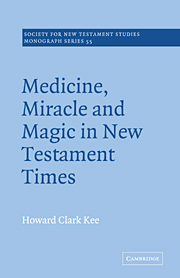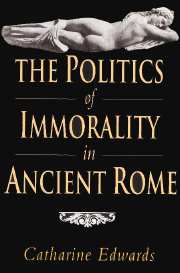Refine search
Actions for selected content:
23990 results in Ancient history
16 - Representing the emperor
- from Part V - Characters
-
-
- Book:
- The Cambridge Companion to the Roman Historians
- Published online:
- 28 November 2010
- Print publication:
- 24 September 2009, pp 261-275
-
- Chapter
- Export citation
Part III - Subjects
-
- Book:
- The Cambridge Companion to the Roman Historians
- Published online:
- 28 November 2010
- Print publication:
- 24 September 2009, pp -
-
- Chapter
- Export citation
7 - Polybius
- from Part II - Contexts and Traditions
-
-
- Book:
- The Cambridge Companion to the Roman Historians
- Published online:
- 28 November 2010
- Print publication:
- 24 September 2009, pp 123-136
-
- Chapter
- Export citation
23 - Ancient Roman historians and early modern political theory
- from Part IV - Transformations
-
-
- Book:
- The Cambridge Companion to the Roman Historians
- Published online:
- 28 November 2010
- Print publication:
- 24 September 2009, pp 362-379
-
- Chapter
- Export citation
15 - Characterization and complexity: Caesar, Sallust, and Livy
- from Part V - Characters
-
-
- Book:
- The Cambridge Companion to the Roman Historians
- Published online:
- 28 November 2010
- Print publication:
- 24 September 2009, pp 245-260
-
- Chapter
- Export citation
12 - The rhetoric of Roman historiography
- from Part IV - Modes
-
-
- Book:
- The Cambridge Companion to the Roman Historians
- Published online:
- 28 November 2010
- Print publication:
- 24 September 2009, pp 197-213
-
- Chapter
- Export citation
Frontmatter
-
- Book:
- The Cambridge Companion to the Roman Historians
- Published online:
- 28 November 2010
- Print publication:
- 24 September 2009, pp i-xviii
-
- Chapter
- Export citation
8 - Time
- from Part III - Subjects
-
-
- Book:
- The Cambridge Companion to the Roman Historians
- Published online:
- 28 November 2010
- Print publication:
- 24 September 2009, pp 139-151
-
- Chapter
- Export citation
Part II - Contexts and Traditions
-
- Book:
- The Cambridge Companion to the Roman Historians
- Published online:
- 28 November 2010
- Print publication:
- 24 September 2009, pp -
-
- Chapter
- Export citation
Part V - Characters
-
- Book:
- The Cambridge Companion to the Roman Historians
- Published online:
- 28 November 2010
- Print publication:
- 24 September 2009, pp -
-
- Chapter
- Export citation
20 - Josephus
- from Part IV - Transformations
-
-
- Book:
- The Cambridge Companion to the Roman Historians
- Published online:
- 28 November 2010
- Print publication:
- 24 September 2009, pp 319-331
-
- Chapter
- Export citation
Bibliography
-
- Book:
- The Cambridge Companion to the Roman Historians
- Published online:
- 28 November 2010
- Print publication:
- 24 September 2009, pp 418-454
-
- Chapter
- Export citation
Part IV - Modes
-
- Book:
- The Cambridge Companion to the Roman Historians
- Published online:
- 28 November 2010
- Print publication:
- 24 September 2009, pp -
-
- Chapter
- Export citation
14 - Intertextuality and historiography
- from Part IV - Modes
-
-
- Book:
- The Cambridge Companion to the Roman Historians
- Published online:
- 28 November 2010
- Print publication:
- 24 September 2009, pp 231-242
-
- Chapter
- Export citation
4 - Alternatives to written history in Republican Rome
- from Part II - Contexts and Traditions
-
-
- Book:
- The Cambridge Companion to the Roman Historians
- Published online:
- 28 November 2010
- Print publication:
- 24 September 2009, pp 65-76
-
- Chapter
- Export citation

Medicine, Miracle and Magic in New Testament Times
-
- Published online:
- 24 September 2009
- Print publication:
- 21 August 1986
18 - Barbarians I: Quintus Curtius’ and other Roman historians’ reception of Alexander
- from Part V - Characters
-
-
- Book:
- The Cambridge Companion to the Roman Historians
- Published online:
- 28 November 2010
- Print publication:
- 24 September 2009, pp 288-300
-
- Chapter
- Export citation
2 - Postmodern historiographical theory and the Roman historians
- from Part I - Approaches
-
-
- Book:
- The Cambridge Companion to the Roman Historians
- Published online:
- 28 November 2010
- Print publication:
- 24 September 2009, pp 24-40
-
- Chapter
- Export citation
19 - Barbarians II: Tacitus’ Jews
- from Part V - Characters
-
-
- Book:
- The Cambridge Companion to the Roman Historians
- Published online:
- 28 November 2010
- Print publication:
- 24 September 2009, pp 301-316
-
- Chapter
- Export citation

The Politics of Immorality in Ancient Rome
-
- Published online:
- 23 September 2009
- Print publication:
- 26 February 1993
